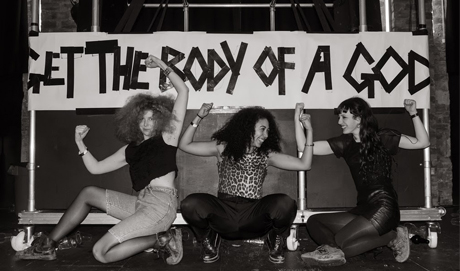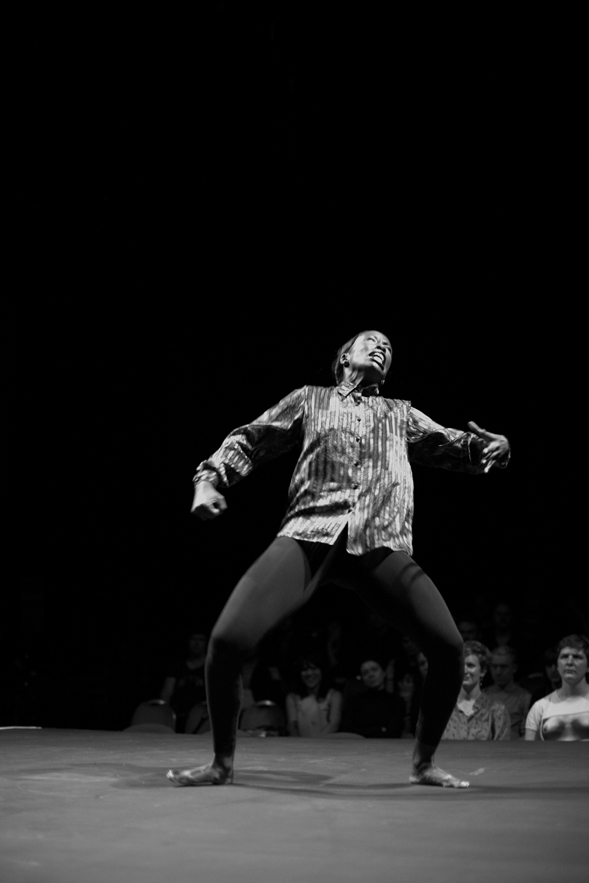
Make a Way Out of No Way
The art and politics of wayward communities who refuse to be bound by the fictions of race and sex.
What we wrote about it at the time: This Episode is about dissonance, divergence and disruption. It’s about flight and fugitivity. It explores the gap between the presumed social norms of race, sex, gender and sexuality, and the qualities of lived, real experience those norms fail to allow for. It is about the ideological weapons of control ‘democracy’ utilizes to create spaces so tight it seems impossible to manoeuvre within them. And it asks whether it is possible for communities, even while so constrained, to practice being somewhere else – practically, socially and aesthetically making a way out of what is at hand and rehearsing in anticipation of what is to come.
ReadThis Episode questions categories of race, sex, gender and sexuality and celebrates communities who’s politics and art forms prove the lie of such distinctions. It is about realness and bodies that tell many stories simultaneously. It is about working class American dance (Krumping, Flexing, Mutant, Voguing), black poetry, queer counter-publics, cultural history and theology, ballroom & house music. It is in conversation with communities who challenge the prison industrial complex and who organise in the face of multiple oppressions. It features a queer operatic requiem, the greatest film in the African-American canon, and counter canonical impulses at the dawn of a singular black cinema. It is about the noise of black and/or queer sociality.
To be marooned, a fugitive in flight, is not always a bad thing. It can only mean, at the best of times, that one is pursuing love. – Joy James
0
The wayward create upheavals and incite tumult. They come and go as they please; they are riotous; they are itinerant and never settle; they are fugitive; they are excessive rather than efficient, they are in open rebellion against society – Saidiya Hartman
1
A social norm – to be sane, to be white, to be cultured, to be straight – isn’t a fixed truth. It’s not set in time and it has nothing to do with nature. Dominant social norms are ideals: packaged as a truth, enforced by a system predicated on violence. They overlap to create a moving script that we mentally and bodily perform, creating us as individuals. Beatriz Preciado calls these “living political fictions”, in which the body is the principle character.
People closer to the current norms are granted certain privileges, while still being asked to naturalise misery and guilt. Those further from them are deemed errant or beyond reason; surplus and less-than-human; pathological or criminal.
How does it feel to be a problem? WEB DuBois
2
We have been talking a lot about imaginative and lived practices of flight away from such imposed norms. On a song like Space is the Place, Sun Ra wasn’t setting out a free-jazz based practical programme of interstellar travel. In Stars in My Pocket Like Grains of Sand, the black queer Sci-Fi writer Samuel Delany wasn’t saying a galaxy with 6,000 different ideas of gender really exists. However, they were both doing something fugitive – in apposition to the current situation, off to one side. Both of them were imagining somewhere other than here, where current oppressions might not prevail. Yet at the same time, in the shape of the Arkestra, or the community that met in the gay bath-houses and piers in New York, they were already rehearsing what that elsewhere might be like. In flight from this world, they created worlds within it, organised around their collective desires – and from there, they fantasised about and practiced for another world yet to come. They were, in a sense, existing in two worlds simultaneously.
I am unsure how to choose between killing myself; becoming a serial killer; devoting my life to the trans-moral development of humanity as a species and its intentional mutation; and forming a trans-feminist army whose mission would be to do in everything opposed to it, without distinction. And all that on behalf of love and planetary charity. – Beatriz Preciado
3
We like that quote from Beatriz a lot. In the face of understandable uncertainty, it suggests a set of practices. And practice has two main meanings. It’s an ongoing thing that that you do now – an activity, a pursuit. But it’s also what you do in preparation for something, in pursuit of it: repeating, rehearsing, exercising, getting better or more skilled at a task or performance – ready to use it when it’s needed.
And just like Sun Ra, or Delany, Beatriz isn’t suggesting we practice deviance or transgression for its own sake – this cedes too much power to those who create the laws and ideals we might then transgress. She is caught in an uncertainty about how best to practice a kind of militant love; one that just plainly refuses to accept any norm-based normality in the first place.
Science fiction isn’t just thinking about the world out there. It’s also thinking about how that world might be—a particularly important exercise for those who are oppressed, because if they’re going to change the world we live in, they—and all of us—have to be able to think about a world that works differently. – Samuel R Delany
4
It is the kind of practicing discernable in the House|Ballroom community, in their alternative kinship structures (houses) that replace the church or biological families from which they were so often rejected. It can be seen in the dance forms arising from working class communities of colour in America, among them Krumping, Flexing, Footwork, Voguing and Mutant – bodily acts that negotiate two worlds at the same time, that move between spaces of constraint and freedom. It has something to do with what filmmaker Arthur Jafa calls abnormativity, and the lived experience of the black lesbian aggressives Kara Keeling writes about. Just as it has something to do with the social forms of organizing that resist the current Prison Industrial Complex, and imagine a future without it.
Waywardness is the refusal to be governed. It is the next phase of the general strike, the flight from the plantation and refusal of slavery and the demeaning conditions of work, this time it happens in the slum. It is a social experiment and an effort to elaborate new forms of existence. – Saidiya Hartman
As much as possible, events at Episode 6 will take place around one stage, which will double as a table. We’d like as many people as possible to sit with us at this stage/ table, with everybody else fanning out from it. So: each of the events will then be in different registers of thinking or listening or being together – either watching and listening or contributing to a performance on a stage (table), or watching and listening or contributing to a discussion around a table (stage). We’ve invited lots of different people to sit at/ be on that table/ stage at different times. In most cases they will start the performances or discussions. But we also invite you to join us at this table, and in those events as they develop.
The Episode was reviewed in The Skinny by Jean-Xavier Boucherat and in The List by Gareth K Vile.
Programme Events

Waywardness
Saidiya Hartman
A socio-poetic reading on wayward communities – The wayward create upheavals, incite tumult. They come and go as they please; they are fugitive; they are in open rebellion against society.

Killer of Sheep
Killer of Sheep is an undisputed masterpiece of African-American filmmaking and one of the most poetic, perceptive dramas ever made about family and community.

Make a Way Out of No Way: Club
Kia Labeija MikeQ Miss Prissy Pony Zion
Is it possible to dance our way out of the hardened stances and identity prisons we are locked in?

Fugitivity and Waywardness
Fred Moten Saidiya Hartman
An open conversation hosted by Saidiya Hartman and Fred Moten around ‘fugitivity’ and ‘waywardness’ and what it means to be in flight, excessive or ungovernable.

Touching the Imperceptible
Arthur Jafa Kara Keeling
A performed filmic conversation on queer and black world making.

Speculum Orum
M Lamar
A queer black operatic requiem for piano and voice that asks us to stay in the hold of the slave ship, that tries to understand the connection from the slave ship to the prison.

You’ve Never Seen Pain Expressed Like This
Danielle Goldman Kia Labeija Miss Prissy Pony Zion
A freestyle performed conversation for bodies and voices – with the Queen of Krump, the master of Vogue Femme Dramatics and the rising star of Vogue Women’s Performance.

Dance Workshop
Glasgow Open Dance School Miss Prissy
A movement-based workshop on Krump and the politics of how we teach, learn and listen with our bodies. Move with us!

From Subjection to Subjection
Charlene Sinclair Saidiya Hartman Tourmaline
A conversation about the movement for prison abolition and refusing the logic of race and sex that underpins the criminalisation and mass incarceration of communities.

Dreams are Colder than Death
Arthur Jafa
A landmark film on black life – a poetic filmic constellation of meditations, fragments and interviews on what it means to be black in America in the 21st century, from one of its great cinematographers.

Realness
Charlene Sinclair Fred Moten Icon Ayana Christian Michael Roberson Tourmaline
A discussion about what is at stake in the performance of realness and the practice of passing, and how they are both acts of survival and resistance.

Mutual Instruments
Fred Moten Miss Prissy
Can our favourite Vegas-born poet of prophetic blackness and a South Central transmuter of social rage into beauty feel through each other?